AudioCulture
The noisy library of New Zealand music
Te pātaka korihi o ngā puoro o Aotearoa
Corrella
They not only got their festival slot, but became one of our foremost local reggae acts with their top five chart hit, ‘Blue Eyed Māori’.
Pīpīwharauroa “Pipi” Campbell (Ngāi Te Rangi, Ngāti Hē, Ngāti Pūkenga) grew up in an environment where singing came naturally. As a child, he regularly sang at family gatherings. One of his cousins was another budding singer, Stan Walker.
“I used to believe that everyone could sing,” says Pipi, “because I had so many people in my family who could sing. It wasn’t until I went to Te Aute College and joined the choir, where I found the teacher had to keep telling some of the other kids when they were missing their notes. I was like, ‘man, what’s going on?’ So you could say we had a super-talented family in that respect. Then I joined the Navy and when I came from overseas, I learnt that Stan had won Australian Idol. That was when I realised just how good a singer he was.”
After Pipi joined the Navy, he became a founding member of The Marinades (“Marines that would serenade you”), which focused on classic covers such as ‘Big Yellow Taxi’ and ‘Wagon Wheel’. They practised in the garage of guitarist Moresby Kainuku, who lived at 26 Corrella Road, Belmont, among a group of houses that had been put aside for Navy personnel.
Corrella’s founding members were in the Royal New Zealand Navy
The band also included three other members of the Navy – guitarist/songwriter Te Naawe Tupe (Ngāi Tūhoe), bassist Codi Wehi (Ngāti Maniapoto), and drummer Tom Scrase (formerly of dDub and member of rhythm-based ensemble, Strike Percussion). Through a mutual friend, the band added keyboardist Taulu “Ulu” Schuster, a church minister, nicknamed “The Rev”. The line-up came together with the addition of singer Te Aranga “Te Ara” Savage.
They changed their name to Corrella after the road where they practised and decided to go beyond just cover versions.
“Each year, I’d gone to the Raggamuffin and One Love festivals,” says Pipi. “Then in 2020, me and Te Naawe went to One Love and we just decided, ‘Let’s just write some originals and try to get on that stage.’ We got back to Auckland and did a big planning session. We wrote down ‘playing at One Love after four o’clock in the afternoon’ as our big goal.”
However, they hit an early roadblock. “Around that time, Tomorrow People were running a competition to look for a new female lead singer. We were super encouraging and told Te Ara to go for it, then lo and behold, she got the job. Rebekah [Brady] actually came second in that competition, so we ended up swapping out Te Ara and got Rebekah instead!”
Fortunately, Rebekah Brady (Ko Te Arawa te iwi, Ko Ngāti Rangatihi te hapū) soon blended into the group and they were able to continue their rise unimpeded.
Summertime breakthrough
Corrella decided their first single should be an ode to the great New Zealand summer, ‘Summertime In Aotearoa’, which they released in November 2020. Its goodtime vibe saw it picked up as the backing music for an advertisement on Māori Television. Cunningly, the lyrics specifically mentioned the band’s name (“This is Corrella, Corrella in the Summertime”), so even a first time listener knew who they were listening to. It wasn’t an overnight hit, but kept snowballing, picking up streams until it had passed a million.
Corrella was booked for a Navy function, then found out Six60 was the surprise guest
They ended the year by achieving an unexpected milestone. “The Navy used to do these big end-of-year functions and we were booked to perform. Then we were told that Six60 were going to be a surprise guest and they played before us, so it was like they were opening for us! They were really cool and we’ve got to hang out with them a few times since, but that was where it all started.”
In March 2021, Corrella released ‘Chur Māori’ which was driven by a reverb-drenched skank. This was followed by a self-titled EP which showed different aspects of their sound. ‘People People’ included a bluesy guitar solo that would become a signature of the group, and Te Naawe contributed the song ‘Heke’ about Māori chief Hōne Heke, with a slow-but-heavy beat, upfront bassline, and trickles of old-school funky synth.
However, Pipi found that they struggled to properly publicise the release. “We had a publicist when we released ‘Summertime in Aotearoa’, but we didn’t realise how important they were until we released the EP without getting one on board. The EP went nowhere for the first six months. I guess one big turning point was having a meeting with Jeff Newton from NZ On Air. We got on well with him because his dad was in the Navy and he lived on Corrella Road when he was a youngster. We met with him and told him our end goal of playing at One Love. He pretty much worked backward from there, laying out the blueprint of what we needed to do. We just tried to hit all the big points he laid out. We did all kinds of gigs for free and played as an opening act – just doing whatever we could to spread our name. Then we finally got singles funding and started to put together some songs to create our album.”
Corrella upped their workload, cramming into small venues like Portland Public House in Kingsland, Auckland, or driving long distances for shows, the emphasis being to play in front of a decent-sized audience rather than making money.
It had always been clear that having so many Navy personnel would mean their progress might be interrupted by work duties. Sure enough, the call came for Te Naawe and Codi to head offshore on patrol. Fortunately Corrella had already begun recording sessions at Parachute Studios so they kept working on the tracks in the meantime. They also picked up Josh Taletutulu as a back-up and second guitarist. Their next few singles, ‘Seafarer’ (inspired by Navy life), ‘Local Stranger’, and ‘We On’ kept the momentum up, while their early singles continued to gain popularity.
Connecting with Te Ao Māori
‘Raumati’ showed a remarkable new side of the group. Pipi originally wrote it as a waiata-ā-ringa (action song) for a Navy kapa haka competition. The event was a sign of how far things had come since he’d first enlisted.
In his early years, he overheard his seniors making disparaging comments about Māori. As a result, he had tried to downplay his heritage, despite having been a native te reo Māori speaker as a child and growing up with an association to Mangatawa Marae and its associated maunga in Tauranga.
“I was born and raised in te ao Māori,” he says, “but I turned my back on my culture for a while there while I was in the Navy. My last name is Campbell and in the Navy people are only referred to by their surname so I felt like I could hide the fact that I was Māori, which sounds silly when I think about it now. Then one night I had a very powerful dream. It sounds airy-fairy, but it just changed my whole perspective on life. I had this strong feeling around how I’d been given all these gifts – the privilege of growing up in full immersion, knowing what it is to be Māori. So I changed my work focus from being a Navy engineer to working to normalise Māori culture within the organisation as the marae coordinator.”
“I’d been given all these gifts – the privilege of growing up in full immersion” – “Pipi” Campbell
He hadn’t taught his son to speak te reo Māori, but now did his best to introduce him to the language and enrolled his daughter into Kōhanga Reo. He also chaired the board of Te Kōhanga Reo o Maungārongo in West Harbour, helping it to avoid being closed down.
He had always thought that if he wrote a waiata, then he would include his namesake bird, the pīpīwharauroa, which is a harbinger of good luck. ‘Raumati’ was an incredible success, becoming their third million-streaming track. The song was also the first time they worked with Jimmy Colbert producing. Pipi was impressed with what he brought to the group.
“He was really one of the key parts to taking our musicianship up another level, for sure. As we got closer and closer to our goal of playing at One Love, I think we just started to realise the level of musicianship and professionalism you need to get up on those stages, instead of just being part-time musicians in a part-time band.”
Corrella rounded out 2022 with another online hit, ‘Skankin’, which showcased their ability to inject a funk feel into their reggae sound. They were fast becoming the rising stars of local reggae, but it would take one final push to get them to the top tier.
In early 2023, Corrella went through another round of line-up changes. Pipi brought on board a new backing singer – his younger sister, Ngawaiwera, who previously sang with Origin Roots Aotearoa and was a backing vocalist for 1814. When Rebekah announced she was pregnant and was leaving the group, Ngawai took over her role.
When Māori Language Week arrived in May, Corrella released a song they had recorded for the Waiata Anthems series, ‘Ko Au’. Pipi wrote it to represent his own journey and thereby encourage other Māori to see that their culture was there to back them and could lift up their spiritual wellbeing/ wairua (“hei whakapiki ai tō wairua”). Musically, it saw the group lean into their rock side with not a hint of reggae rhythm to be found, but Pipi enjoyed the freedom to try other genres.
“I never thought I’d be in a reggae band. I love reggae music, but it’s not my only genre of choice, so I feel like we try not to just do reggae. Though it’s usually the reggae songs that do well.”
The Road From 26
Corrella’s debut album, Road to 26 (2023), also drew its name from their practice space at 26 Corrella Road. The album was preceded by ‘Little Circles’ which they’d written to showcase Rebekah’s voice, adding a soulful R&B feel to the laidback reggae groove. Pipi wrote the track ‘Lady Divine’ as a love song to his wife and it became another standout.
However the song that would take the group to the next level was ‘Blue Eyed Māori’. Te Naawe was originally inspired by a discussion with elders about the blue eyed children that appeared in Māori villages in the wake of colonisation, with the soldiers who had fathered them long gone. Te Naawe was also the godfather of a young Māori girl who had blue eyes so he wanted the lyrics to express his mixed feelings about the mixing of races (“She’s a monster / and an angel”). It was a tricky balancing act, but the song sounded on the surface like a break-up song and the deeper meaning was left ambiguous enough that listeners could make up their own minds.
Pipi admits that the song was never even meant to be a single, despite it being a band favourite and one he’d asked to sing (though Te Naawe decided to do the lead vocals himself). In fact, the album as a whole failed to get much pick-up, due to a lack of planning.
‘Blue Eyed Māori’ was never meant to be a single, though it was a band favourite
“Everyone thought that someone else was doing what was needed for the album launch. It turns out no one was doing any of these parts. So it just released into the ether with no one pitching songs to radio or properly marketing it. The album was sort of dead in the water for the first three months. We finally promoted the album on a winter tour, which we managed to sell out. Then ‘Blue Eyed Maōri’ took off on TikTok. There was a filter on there for people to change their eyes from their natural colour to make them blue and I think that’s how people started using it. So it just organically grew on TikTok and really came out of nowhere.”
Te Naawe was away at sea at this point and Pipi emailed him to let him know the song was gaining popularity. It hit the top five on the main New Zealand chart, racking up tens of millions of streams in the process. Meanwhile on the New Zealand-only chart, it reached No.1 and stayed there for 58 weeks, breaking the previous record.
Jimmy Colbert had continued to work as producer for the group; he also joined as fulltime bassist, while drumming duties were taken by Vion Slinger. Pipi and Te Naawe were now the only remaining original members.
Corrella finally achieved their aim of taking the stage at One Love in 2024. Not only that, but their own headlining shows had scaled up to large venues like the Powerstation in Auckland and San Fran in Wellington. They also took their first trip over the Tasman to perform at the Promised Land festival on the Gold Coast.
Their remarkable rise was recognised at the Aotearoa Music Awards. They won both Te Tino Waiata ā-Iti Rearea o te Tau / Breakthrough Single of the Year and Te Manu Taki Taketake o te Tau / Best Roots Artist.
From strength to strength
Corrella’s debut album was picked up after its release by Loop Recordings Aot(ear)oa, which made them labelmates with L.A.B. As a result, they joined them as a support act for national tours. It helped build their fanbase, while they worked towards their follow-up album, Skeletons (2024). The line-up continued to evolve with the arrival of Elijah Wilson (keys) and Finau Filivau (drummer). Pipi believes the turnover of members wasn’t surprising:
“as we got a bit bigger, it became easier to get good musicians to join us.” – “Pipi” Campbell
“The commitment level required to be in the band steadily picked up and for the first few years we were doing all this work with no reward. Even for myself, I’ve got a family with kids and so it was a struggle having this hobby turn into more like a second job! But we managed to stick it out and as we got a bit bigger, it became easier to get good musicians to join us.”
The album Skeletons (2024) showed that their base continued to be in reggae, but they were happy to break free when it suited them, as on the poppy acoustic ballad, ‘All There Is’. Pipi enjoyed the ability to experiment.
“We’ve always been able to play whatever we want, but I think during the sessions for Skeletons we really gave ourselves the chance to experiment. We wrote some pop songs and even tried our hand at country music. Though we wasted way too much money in the process!”
Ngawai was now a core member of the group and Pipi knew that she needed a song to call her own, so they wrote ‘How Will I Know’.
“It’s way easier to perform in front of a crowd if you’re singing your own song that the audience know, right? So we pushed that song and it did really well. When we toured with L.A.B., the response we got with that song from crowds in New Zealand and Australia was epic.”
By this stage, Corrella had found that their name was causing some confusion further afield because there was also a group from Manchester (England) named Corella (with only one “r”). Fortunately, the two groups exchanged friendly messages and neither group was interested in wresting the name off the other. They joked about getting a bump of new followers whenever the other group did a big show.
Their connection to the Māori music scene remained strong. They wrote the song ‘Maumahara Noa Ahau’ with L.A.B. and Brannigan Kaa, then did their own song ‘Kua Kotahi Rā’ for the Te Matatini competition. Meanwhile, they cemented their status in the wider music scene with another win at the Aotearoa Music Awards, once again winning Te Manu Taki Taketake o te Tau / Best Roots Artist in 2025. Their winter tour took in 10 dates, half of them in Australia.
Corrella are now one of Aotearoa’s biggest reggae acts and regular visitors across the Tasman. Pipi enjoyed the chance to play alongside groups he grew up with or even become friends with them – particularly 1814, Katchafire, and House of Shem. He also continues to be inspired by the amazing level of success that L.A.B. and Six60 have managed to achieve. However, one of his biggest highlights of his time in Corrella is more personal.
“One musical milestone that was particularly special for me was being able to perform with Stan and my sister at a show up north. You can see a video of it on our Instagram. The three of us were singing together just like our grandparents would have done all that time ago. It was such a cool moment.”
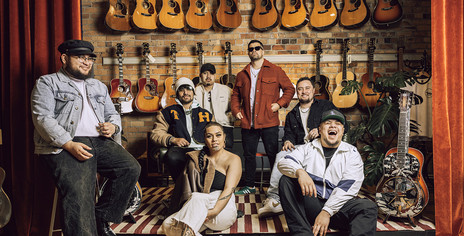
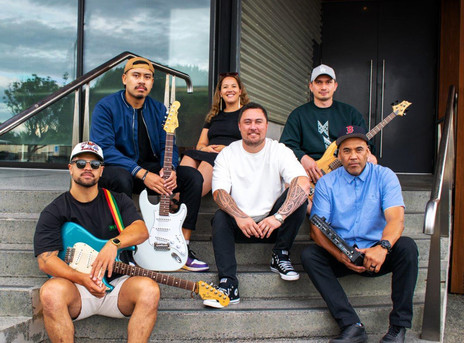
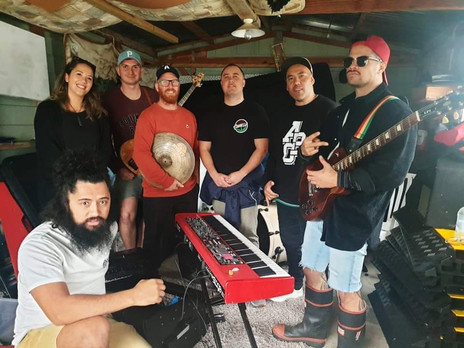
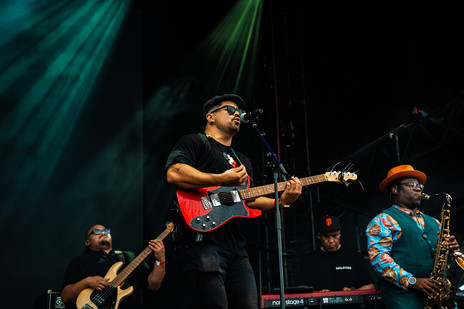
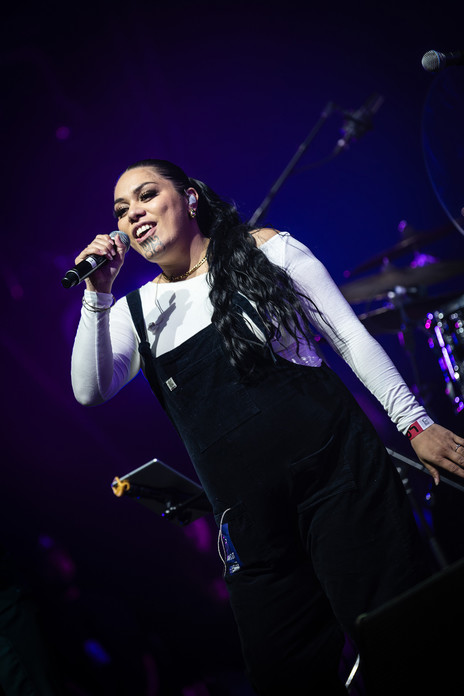
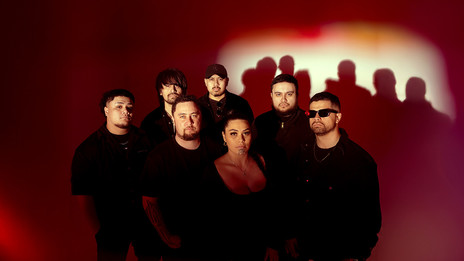
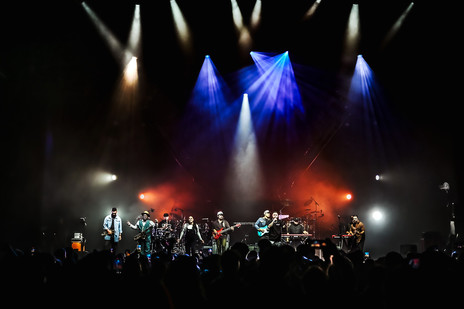
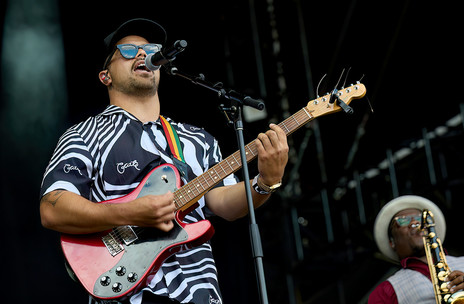
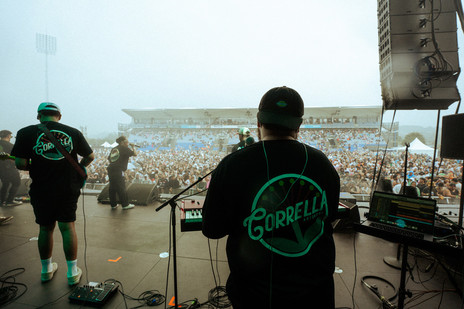
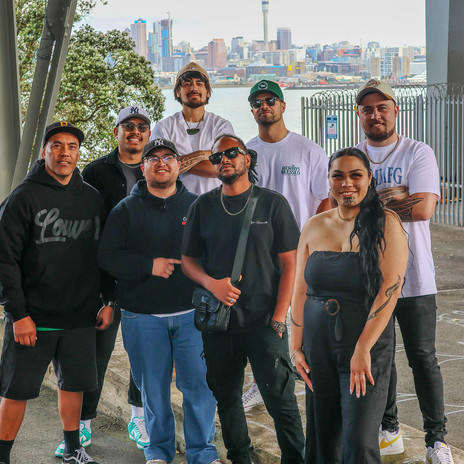
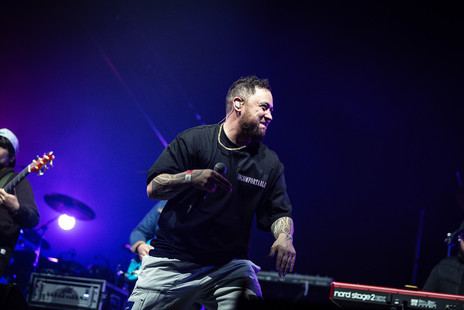
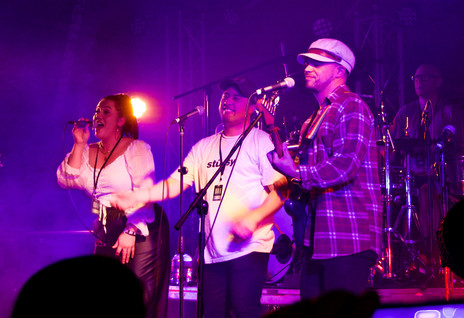
Visit our sister site
NZ On ScreenMade with funding from
NZ On Air






